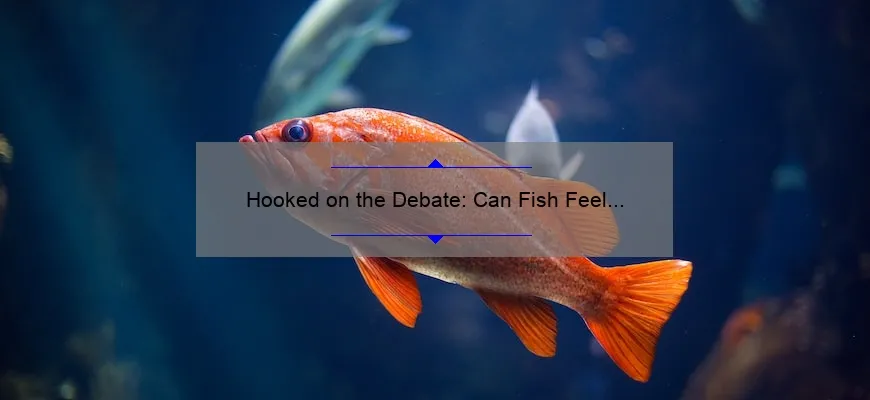Short answer can fish feel the hook:
Fish do not have the same nervous system as humans, so they cannot feel pain in the same way. However, they are able to detect pressure changes and vibrations in their environment which could make them aware of the presence of a hook or other predator.
Step-by-Step Guide: How to Determine if Fish Really Feel the Hook
Fishing is an activity that has been enjoyed by humans for thousands of years. Casting a line, waiting for the fish to bite and reeling in your catch can be quite exhilarating. However, as with any sport or hobby, there are ethical considerations to take into account.
One question often asked is whether or not fish feel pain when they are caught on a hook. The answer may surprise you – yes, they do.
In this step-by-step guide, we will discuss how to determine if fish really feel the hook and what you can do to minimize their pain and suffering during the fishing process.
Step 1: Understanding Fish Anatomy
The first step in understanding whether fish can feel pain is to get familiar with their anatomy. Fish have complex nervous systems similar to those found in mammals like us humans. They also possess nociceptors, which are specialized cells designed to detect tissue damage caused by sharp objects like hooks.
Additionally, research shows that fish have opioid receptors which react similarly to ours when exposed to morphine-like substances. This suggests that these creatures must indeed experience something akin to discomfort when hooked.
Furthermore- it has been established through multiple studies over time that many species of fishes display observable behaviors indicating physical distress; such as gasping open-mouthed breaths out of water (termed ‘air gulping’), erratic swimming patterns and decreased appetites afterwards amongst other clear signs.
Step 2: Choosing Fishing Equipment Wisely
Once you understand more about the sensitivity of a fish’s biology , choosing equipment that minimizes harm should become top-of-mind during every fishing trip . Thankfully ,there are options available .
Choose barbless hooks vs barbed ones – They’re easier for anglers taking care while removing them from hooked fishes mouths.
Use smaller size gear suited relative sizes between conditions where one would realistically expect aquatic fauna . Using disproportionate gear just because it maximizes your chances does nothing but hurt defenceless underwater creatures. In addition, excessive strain and pressure on fishing line caused by over-reel or rod jerk manipulation can also rip out the protective mucous layer that covers fishes scales
Step 3: Consider Catch-and-Release Techniques
If you are looking to lessen any harm done to fish during your catch whilst still enjoying a leisurely time fishing , consider doing some research into different releasing techniques . These methods ensure minimal damage is sustained by the fish before it’s returned back in its natural habitat.
One technique could be using wet-gloves when handling the hooks instead of bare hands – this helps reduce additional stress triggered by external scents such as harsh odours our skin excretes naturally(eg:soapy residue from washing).
Another option would be trying artificial lures which can provide an added benefit of being potential nutrition substitutes if ingested(though always triple-check beforehand) so that upon release,hooked-on-fish wouldn’t need to burn calories searching for food post-injury.
In conclusion, there’s good reason why empathy towards fish should become increasingly important within recreational activity . They may not look like us but they show enough emotions through behaviour and physical reactions when hooked.And since we humans hold responsibility as stewards of ecological balance earth wide , best practice must encompass minimising preventable damage caused when making use of nature itself.It is our duty!
Your Top Questions Answered: Can Fish Feel the Hook FAQ
One question that pops up often among beginner anglers is whether fish can actually feel the hook piercing their mouths? This concern might stem from our own knowledge as humans who feel pain receptors when physically injured; making us worry about inflicting harm onto animals while we enjoy our favorite activity.
The answer, interestingly enough, isn’t exactly straightforward. Scientifically speaking, fish do not possess pain receptors like mammals do (including us humans). Yet they’re able to sense pressure changes in their environment and react accordingly based on those stimuli. Think of how they instinctively evade predators or swiftly snatch unsuspecting prey near them.
According to experts around 30% of all freshwater fish species will try new bait once before disregarding it — meaning luring them requires precise presentation techniques—proper line selection, cast timing/speed/accuracy etcetera. So instead of feeling physical pain like we would assume “hooking” someone would cause discomfort for them every time nature dictates otherwise: they’ll still be caught by anglers if presented with tempting offerings!
It’s important to add here that some studies suggest chemical signals are released from cells along with physiological responses indicating stress levels – which could lead some people to believe that fish feels psychological disconcertment at times! Regardless scientists & animal rights enthusiasts both maintain laws requiring best handling practices prioritized during capture then following release back into waters since these beautiful creatures play vital ecological roles benefiting many organisms throughout natural environments even if not fully understood yet
In simpler terms, fishermen should always utilize responsible catch-and-release techniques whenever possible simply because it only makes ethical sense toward aquatic life. If you can’t responsibly fish, it’s best not to participate at all!
Digging into the Science: Top 5 Facts About Whether or not Fish can Feel the Hook
Fishing is one of the most popular outdoor activities around the world, with thousands of people going fishing every day. Fishing can be incredibly calming and peaceful but it’s also viewed by some as a cruel sport since many believe that fish have feelings too.
In recent years, there has been an ongoing debate about whether or not fish can feel pain when they are caught on a hook. Here are the top 5 facts digging into the science behind this controversial issue:
1) Fish brains are wired to sense pain
Fish have highly evolved nervous systems, which means that their bodies react instantly to external stimuli such as heat, light, touch or sound. Additionally, in research conducted by Professor Lynne Sneddon from Liverpool University found out that “fish possess nociceptors – sensory receptors for painful stimuli.”
2) The Hook Tears Through Sensitive Tissue in Fish Mouths
When a fish is hooked through its mouth or gills,the sharp point tears right through sensitive tissue and nerves causing intense discomfort. This often results in internal bleeding throughout the head area or across vital organs like kidneys due to loss of blood.
3) Different Types of Hooks Cause Different Results
Various fishing hooks produce different types of injuries to fishes; examples include short-shanked circle hooks, J-hooks and barb-less designs intended not only catch particular species more efficiently than others but also cause less damage if used correctly.
4) Pain responses vary based upon application duration
Research indicates that acute exposure (momentary amount intensely applied specifically while attempting handling during releasing/landing methods ) causes less distressful triggers relative opposed elongated exposures whereby frequently prolong angling & fighting occurs before it achieves release resulting in severe post-capture shock where recovery outcomes though few then result fatal mannerisms.
5) Influential Factors Determine Degree Of Response From Big Game Species Such As Sharks And Marlin
The size and muscle mass play significant roles in an individual’s response after being hooked: Marlin & Sharks fight fervently, hampering their own recovery from any injury incurred.To overcome such issues carefully engineered catch and release operations in which it’s carried out after landing done by utilizing fishing boats with live wells to keep the caught fish contained rather than causing a violent struggle or inadequate support for hook removal when releasing.
In conclusion, while there are ongoing debates regarding whether or not fish can feel pain when they are being caught on a hook we urge everyone involved in this sport to consider learning about best practices and equip themselves with knowledge of dealing humanely ensuring adequate care is provided during these circumstances especially if tags are intended for further research as putting oneself humane ethics will help elevate valuable contribution amongst anglers aiding conservation efforts.

